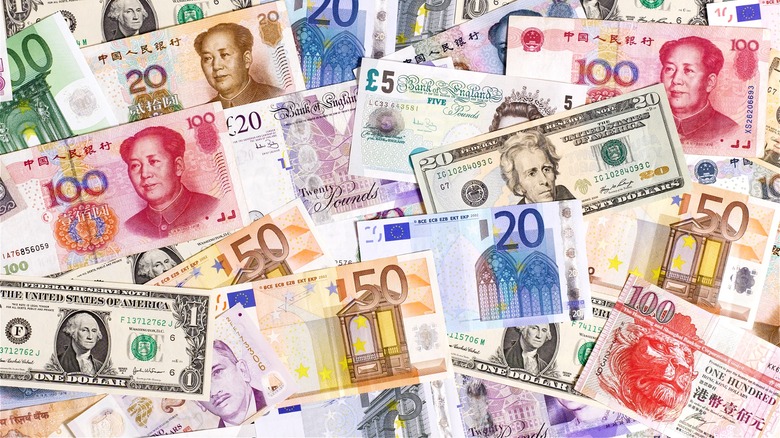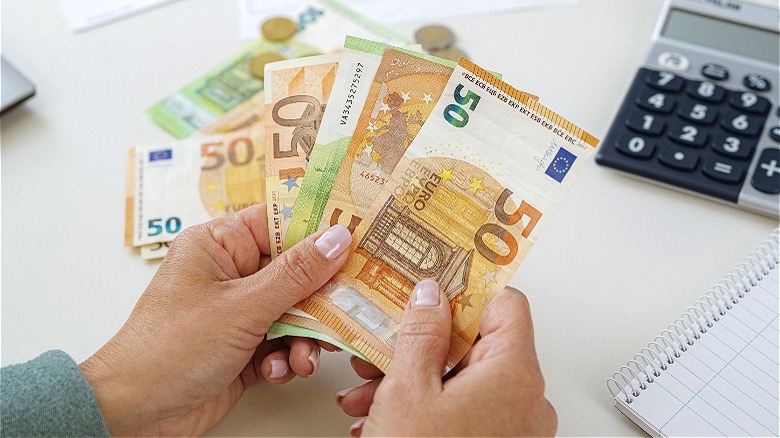You've Been Warned: Traveling With This Type Of Credit Card Will Cost You
There are a LOT of things to consider when traveling. From shrinking overhead bins to a growing frequency of airline delays to the increasingly expensive accommodation options available (Airbnb is not necessarily your best option these days), travel can be a real headache. To make matters worse, traveling internationally can add additional levels of complication to your vacation plans. Beyond visas and even required vaccinations (depending on where you're setting off to), you also have to worry about different currencies. Currency exchange rates, bank policies on traveling abroad, and something known as foreign transaction fees can all impact your travel experience as well as your bank account.
For anyone who might not know, foreign transaction fees are additional fees added on to purchases made internationally or at-home purchases made with a foreign merchant (meaning online purchases with a foreign business). Sometimes these foreign transaction fees can also apply to foreign ATMs, in addition to any additional fees the ATM itself might charge you. While on the surface these fees might not seem like a lot of money, they can add up quickly since they're applied to each individual transaction. Plus, if you're someone who travels regularly, either for fun or for work, these fees can really affect your bottom line after a while.
With all that in mind, it can be worth researching available (and perhaps little-known) credit card perks and something known as a no-foreign transaction fee credit card. These types of credit cards can save you the additional expense of constant fees while traveling internationally.
Understanding foreign transaction fees
Generally speaking, foreign transaction fees are around 2% to 3% of each transaction (calculated in U.S. dollars). This fee is a combination of fees charged by the payment processor (i.e., Mastercard or Visa) and fees charged by the card issuer aka your bank or card issuer. A no-foreign transaction fee credit card offers relief from those pesky fees while also (generally) offering competitive currency conversion rates on your purchases.
This is especially important since, in general, the currency conversion counters you find at airports or in foreign countries will offer less favorable conversion rates, which leaves you with less money to spend on vacation. Having a competitive conversion rate means you're getting as much of your $1 U.S. dollar as possible after it's converted into another currency type, which preserves your buying power and helps your overall budget when traveling.
Another option you might see while traveling is known as dynamic currency conversion, or DCC; this allows you, as a consumer, to be charged for a purchase in your home currency at the point of sale. While it might seem like a good option and a way to simplify doing any conversion math in your head, it's best to steer clear of DCC options when you see them. According to a study from the European Consumer Organisation, DCC exchange rates can be marked up anywhere from 2.6% to 12%, meaning you'll ultimately pay more money on your transactions when using this option (see our guide on money mistakes to avoid when traveling).
Other things to keep in mind when traveling
Beyond looking into a no-transaction fee credit card, there are other currency-related tricks and tips you might want to consider before traveling to a foreign country. For starters, researching how local businesses generally accept payment at your destination can be key. For more rural or out-of-the-way locations, you might find that cash is king. While credit cards can offer consumers more protections, they also cost merchants more in swiping fees so don't expect to be able to use your card everywhere you go. Keeping some cash on you can ensure you don't miss out on a food experience or memento you might want to enjoy on your travels (just remember not everything should be paid for in cash).
It's also important to let your credit card issuer know you're leaving the country before you depart. This ensures your card issuer doesn't flag any sudden out-of-country purchases as suspicious and therefore block your card when you need it most. Not all card issuers require advance notification, however, so make sure to look at your card user agreement beforehand to see what applies to your card. Once you find a credit card that fits your needs, make sure to apply for it far enough in advance of your trip that you can ensure the setup for your new card (as well as the delivery of the physical card) can be completed before you leave. Note, it could also pay to look into potential debit cards that don't charge additional fees for ATM withdrawals in foreign countries.


